Why did Paul write the Book of Romans? What was his purpose in writing it?
The Author
Obviously the author of the Book of Romans is the Apostle Paul as he identifies himself in the very first line; “Paul, a servant of Christ Jesus, called to be an apostle, set apart for the gospel of God” (Rom 1:1). Bible scholars believe it was written around A.D. 60 in Corinth and possibly during his third missionary trip. He wrote it at a time when the church in Rome was facing increasing persecution. Many had lost their jobs, lost their possessions, lost their homes, lost their family, lost their freedom, and many lost their lives.
The Book of Romans
The Book of Romans might be Paul’s greatest written work. It is a literature masterpiece by itself! This book or letter, sometimes called an epistle, has Paul giving the sinner the bad news first and then making them see how good the good news really is (John 3:16). Truthfully, if we see how real God’s wrath is against the sinner (John 3:36b) the mercy of God will seem irrelevant. The vast majority of people think they’re going to heaven based upon what they’ve done, which is contrary to biblical doctrine (Eph 2:8-9), so Paul reminds the church at Rome (and all who read) that “None is righteous, no, not one” (Rom 3:10 and “All have turned aside; together they have become worthless; no one does good, not even one” (Rom 3:12). Do good people go to heaven? No! Only justified people do because none are good…not one! To make his point, Paul brings in the Old Testament, going all the way back to Adam and then moving the reader forward, all the way to Jesus Christ. In doing so, he leads the sinner down the Roman Road to salvation with verses like Romans3:23 which says “all have sinned and fall short of the glory of God” (Rom 3:23) and that “wages of sin is death” (Rom 6:23a).
The Roman Road
From my experiences in witnessing to people about Christ, almost nine in ten believed that they did enough good things to go to heaven. Of course there were atheists I spoke with too and I told them I don’t have enough faith to be an atheist, but among those who expressed a belief in God, the vast majority of them believed that they deserved to go to heaven based upon what they’ve done in their lives. Most have never heard about the need for repentance, which is what half of the message of the gospel (Mark 1:15). Some think that it’s what they do instead of what Jesus’ done, but to add one drop of works to Christ’s atoning sacrifice is to make yourself a co-redeemer and God will have none of it. Christ + Your Works = Zero but Christ + Nothing = Everything!
The Purpose
Paul is clear about the purpose of this letter by writing “the righteousness of God is revealed from faith for faith, as it is written, “The righteous shall live by faith” (Rom 1:17), pointing back to the fact that even in the Old Testament, “the righteous shall live by his faith” (Hab 2:4). The “righteous” is sometimes translated the “just” which means the justified since all who are in Christ have been justified. Paul proves this point by writing “those whom he called he also justified, and those whom he justified he also glorified” (Rom 8:30). This includes the patriarchs and matriarchs of the Old Testament (Heb 11) like Abraham who “believed God, and it was counted to him as righteousness” (Rom 4:3; Heb 10:38). The promise to Abraham is a promise to us too if we will place our faith in Christ because “the promise to Abraham and his offspring that he would be heir of the world did not come through the law but through the righteousness of faith” (Rom 4:13) received by “the free gift of God is eternal life in Christ Jesus our Lord” (Rom 6:23b). Paul wants the sinner to know his or her perilous state, standing on the precipice of eternity and judgment, when at any second, God could require their soul (Luke 12:20; Heb 9:27) and make them run to the cross down the path of repentance, turning away from their sins, and running up to and trusting in Christ.
Conclusion
We should thank God that it is “by grace you have been saved through faith. And this is not your own doing; it is the gift of God, not a result of works, so that no one may boast” (Eph 2:8-9). If it were by works plus Christ, then how would we know when we had enough? How would we find this imaginary threshold where we’d know “we’re in?” I thank God that it is a free gift not earned by works and that is even the one Who God grants repentance (2nd Tim 2:25) and Who calls us (John 6:44). Still thinking of works? Here are the only works that will ever help you: “This is the work of God, that you believe in him whom he has sent” (John 6:29).
Article by Jack Wellman
Jack Wellman is Pastor of the Mulvane Brethren Church in Mulvane Kansas. Jack is also the Senior Writer at What Christians Want To Know whose mission is to equip, encourage, and energize Christians and to address questions about the believer’s daily walk with God and the Bible. You can follow Jack on Google Plus or check out his book Teaching Children the Gospel available on Amazon.












